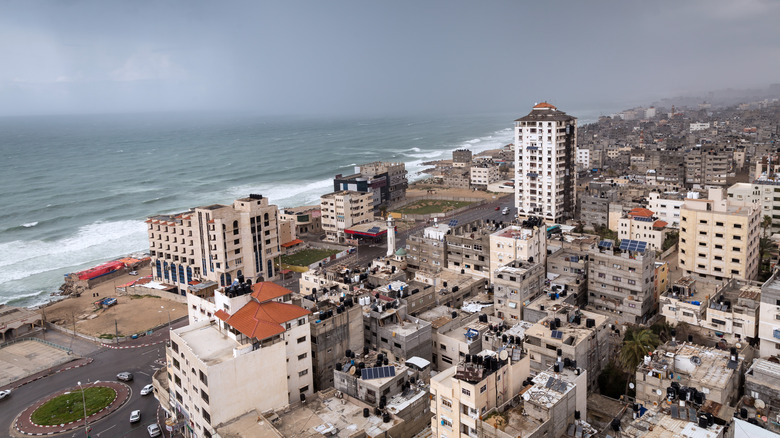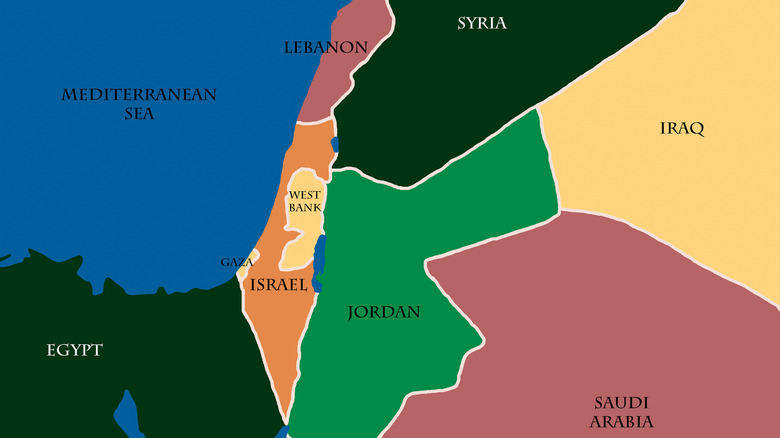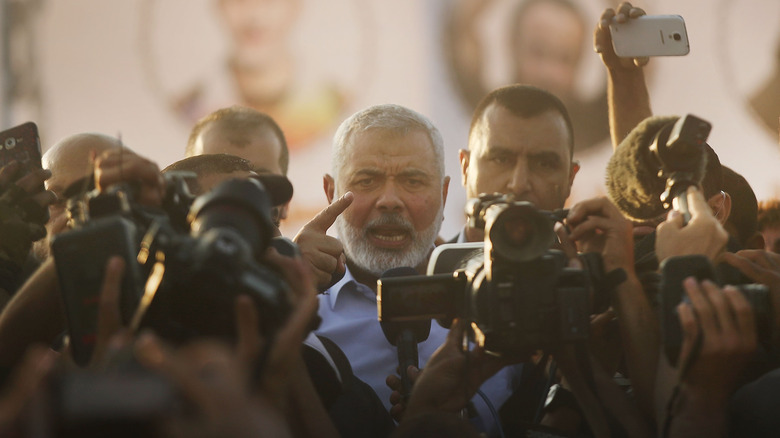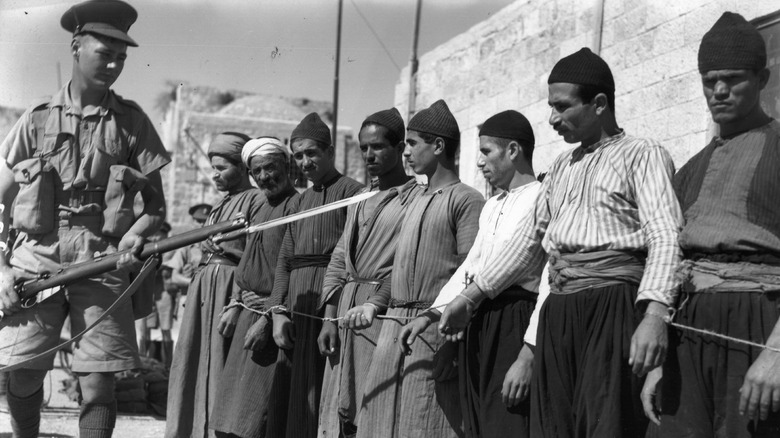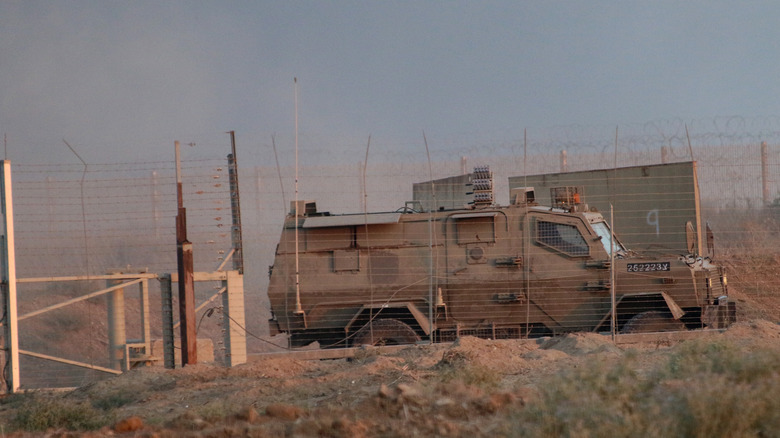What Is Gaza? 4 Things You Should Know
The seemingly endless war in Ukraine has dominated news cycles around the world since its escalation in March 2022. But after 18 months in which the world's eyes were trained on Eastern Europe, attention once more turned to the Middle East in October 2023 after a shocking surprise attack on Israel by the terrorist group Hamas, which operates in the territory known as the Gaza Strip. Early in the morning on Saturday, October 7, 2023, alarms rang out across Israel as without warning Hamas struck the Southern and Central regions of the state with thousands of deadly rockets.
"Over the past hour, the Hamas terrorist organization launched massive barrages of rockets from Gaza into Israel, and its terrorist operatives have infiltrated into Israel in a number of different locations in the south," read a statement from the Israeli Defence Force (IDF), per ABC News. Within hours, reports also emerged that Hamas militants had streamed into Israel, attacking blockades and crossing back into Gaza with scores of hostages, with the Prime Minister of Israel, Benyamin Netanyahu, declaring that Israel is now at war. But while declarations of war often take place between sovereign countries, the situation in the Middle East is far more complex, especially with regard to the status of Gaza, a region that continues to be plunged into chaos.
Gaza is a small densely populated territory
The Gaza Strip is a 140 square mile territory located at the western tip of Israel, flanked by Egypt and the Mediterranean Sea. It has a population of around 2.2 million, the majority of whom are Palestinians. Gaza is one of two territories that make up the State of Palestine, the other being the West Bank, a larger territory toward the northeast of Gaza.
Its status, however, is complicated by the fact that both Gaza and the West Bank have been under Israeli occupation since 1967, following the Six-Day War between Israel and the nearby Arab nations of Egypt, Jordan, and Syria. The war ended in victory for Israel, which took control of a number of significant Palestinian territories, including the Gaza Strip. Though Israel formally withdrew from Gaza in 2005, the area has been subjected to an Israeli blockade ever since, leading to poverty and hardship for the Palestinians who remain there.
Hamas controls Gaza
Formally, both Gaza and the West Bank are officially intended to be overseen and governed by the Palestinian Authority, the body that is recognized by international law, according to the Anti-Defamation League. However, in the aftermath of the Israeli withdrawal in 2005, the Gaza Strip fell under the control of Hamas, a terrorist group formerly associated with the Muslim Brotherhood in Egypt, which won elections in the area in 2007. Since then, no further democratic elections have been held in Gaza, and Hamas, currently led by Ismail Haniyeh (pictured), still holds power in the area today.
Per AP News, Hamas was first established in 1987 by a Palestinian refugee, Sheikh Ahmed Yassin, as part of the Palestinian resistance against Israeli occupation. The name Hamas is an acronym of an Arabic phrase meaning "Islamic Resistance Movement." Following years of fighting and wonton attacks on Israeli civilians, Hamas was declared a terror organization by the U.S. in 1997, with other Western powers later adopting the same stance.
There's been more than a century of conflict in the region
The recent attack by Hamas on Israeli territory has been described as an act of terrorism by several Western countries, including the U.S., the U.K., the European Union, and Canada, according to NBC News, and many nations have since voiced their support for Israel. Hamas has vowed to destroy the state of Israel in its entirety, which it sees as illegally occupying the region they call Palestine. That area includes the Gaza Strip, as shown in recent statements regarding their actions, per ABC News.
The roots of the Israel-Palestine conflict go back over a century, with historians pinpointing the power vacuum that emerged in the region following the fall of the Ottoman Empire in 1918 as the starting point. In the aftermath, France and Britain sought to split the area into two, with Britain establishing a region it called the Mandate for Palestine, seeking to quell the local Arab population's increasing sense of national identity. The Mandate also intended to cater to the area's growing Jewish population, which was swelling in the early 20th century as a result of Jewish migration from Europe due to the growing Zionism movement, also sought to establish a nation of its own in the region. Tensions have led to ongoing violence, with Palestinians now chiefly restricted to Gaza and the West Bank, including East Jerusalem. According to the BBC, the Palestinian claim to East Jerusalem has only limited recognition on the international stage.
Gaza has been described as an 'open-air prison'
Though as a Palestinian territory, the majority of Gaza's population is Arabic – who account for around 99% of people living there — there remains a small but well-established Jewish population of settlers, though many more live in the West Bank.
While the local Jewish population is free to move between Gaza, Israel, and the West Bank, the Israeli blockade on the Gaza Strip severely limits the free movement of Palestinians, with only a few thousand people granted access to the West Bank, according to Gisha. Today, the tiny territory is one of the most densely populated places in the world, with half the population made up of teenagers and children. The Human Rights Watch has described conditions in Gaza as that of an "open-air prison." Egypt has also limited travel out of Gaza. Israel continues to claim that the blockades are in place on security grounds.
In the days following the October 2023 Hamas attack, Israel struck back with rocket attacks on a wide range of targets in the Gaza Strip, including the al-Garbi Mosque in the al-Shati Refugee Camp, which was brought to the ground, according to the Australian Financial Review. In a statement, Israeli leader Benjamin Netanyahu warned that the Israeli offensive was "just getting started" (via The Guardian).
